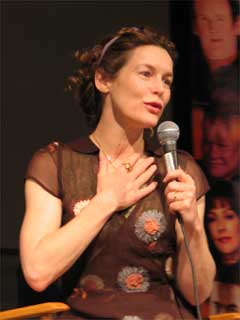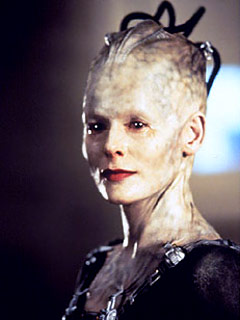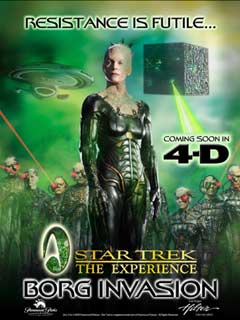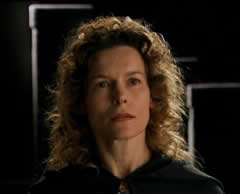
On the eve of the release of STAR TREK: THE BORG FAN COLLECTIVE, the first of a series of DVD box sets that bring together different themes that have appeared throughout STAR TREK’s forty year history, we got to speak to the Borg Queen herself, Alice Krige, by phone at her California home. She could not have been more different to the ruthless character she plays. Gently spoken, with a refined English accent, we spoke of collective consciousness and the futility of resistance.
CP: I’ve never really got into Star Trek, so I’ve had to watch this new Borg Fan Collective DVD to find out what the Borg are about.
AK: What did you think?
The idea behind them is very interesting. Carl Jung spoke a lot about the collective unconscious and the great mother archetype, do you think Borg Queen was a manifestation of those ideas?
I don’t know if that’s what they were aiming at, but certainly what they came up with was an archetype. There’s something very interesting about what they did and I don’t fully understand why she became so iconic. What’s interesting is, when people come up to me and talk about her, and I’m always slightly ambivalent about
the fact that they recognise me without the make-up, I don’t know what that means.
 Because the make-up is quite extreme.
Because the make-up is quite extreme.
It was astounding. People say they can tell from my eyes and voice, but everyone relates to her in a slightly different way, in that people relate to her in a highly specific and personal way. The conclusion I have come to is that she becomes a conduit to a place where they are fearful. Some people look upon her as the embodiment of where technology will take us, others look upon her as the embodiment of amorality, others perceive her as being extremely dangerous, sexually. Different things pop out for different people.
Which is the unconscious, or even sub-conscious, manifesting.
Exactly. Exactly. There was something about her that was iconic and archetypal, but there is a spin to her that makes individual’s connections with her very personal, which is why, I think, the character became, has become, iconic. Who would have thought that she would have established such a connection with people watching the show?
And she wasn’t actually in that many episodes.
In FIRST CONTACT she was in three scenes, and one tiny little scene where I don’t think she even speaks, and that was it, in an hour and a half long film I can’t imagine she had more than ten minutes of film time. Then, when they decided to bring the character into the series, I was working on something else, I wound up
doing the last two episodes of VOYAGER, and I can’t imagine she was in more than three or four of the episodes of VOYAGER.
 Subsequently, I did a ride, as it were, effectively a theme park ride, like a pop culture installation at the Hilton in Vegas. I don’t know if you are aware of it, the Hilton in Vegas is a great big STAR TREK hotel. It has artefacts from STAR TREK, all the bars are named after STAR TREK names, whatever. The Star Trek Experience is what they call it. They have an installation whereby you go into a little ante-room, and you are effectively the public who have been selected to go on this experimental voyage, and you are taken into the body of the spacecraft, and as you are out in space you are attacked by the Borg. We did that on 3D cameras, and there is this third area where they have created the Borg again. It’s just very interesting.
Subsequently, I did a ride, as it were, effectively a theme park ride, like a pop culture installation at the Hilton in Vegas. I don’t know if you are aware of it, the Hilton in Vegas is a great big STAR TREK hotel. It has artefacts from STAR TREK, all the bars are named after STAR TREK names, whatever. The Star Trek Experience is what they call it. They have an installation whereby you go into a little ante-room, and you are effectively the public who have been selected to go on this experimental voyage, and you are taken into the body of the spacecraft, and as you are out in space you are attacked by the Borg. We did that on 3D cameras, and there is this third area where they have created the Borg again. It’s just very interesting.
I was completely uninformed about STAR TREK. I had never watched it so I knew nothing about it when I went in for my initial meeting. Like you, I got hold of a few Borg episodes that had been done prior to the character of the Borg Queen emerging in STAR TREK: FIRST CONTACT. I knew nothing about it. I had no idea of the phenomenon of STAR TREK, and who had any sense the character would somehow tap into the collective unconscious, which is what she did.
Do you see her as a benevolent queen?
I don’t think she is benevolent at all. She is enormously dangerous to humans.
I always perceived her as entirely amoral, and utterly without human conscience.
Her agenda is simply non-human. She doesn’t care about the things human beings care about. As such she is both exciting and very dangerous to the fabric of human society, as it were.
I guess the greatest fear humans have is that if you become a Borg you lose your free will.
Yes, you lose your identity.
You become a collective being but without any free will, which, like you say is amoral.
Absolutely.
Being a collective being is considered to be the next step of human evolution and a good thing, but without free will it is not.
Yes. Then you start off the question of, “do we actually have free will?” We think we do but to what extent do we really have free will as human beings?
That’s a long, long discussion that we don’t really have time for today.
Exactly, and that’s the point, that the character throws up issues like that. Are we actually all Borg drones, in fact?
I’ve seen a few people around here, where I live and they’re pretty close to that, and I imagine there are a fair few in the States too.
Yes, yes. That’s what’s fun about it. When you start talking about it, it actually asks some very unanswerable and imponderable questions. Because, yeah, you do lose free will, but when I look at where I live, this country went to war in Iraq, but before they went a lot of people were opposed to it. When one looks around, to what extent are you conditioned by advertising? And it is very interesting the whole issue of free will. Are we indeed not all Borg drones? And that’s what’s frightening about it, that we’ve been assimilated.
You lived in England for quite a while.
I was in England from about 1976 to the end of 1990.
Did you ever watch DOCTOR WHO?
No I didn’t. I never did. But I know there is a whole new version of Doctor Who being shown there at the moment. Why?
There is a group of characters in that called the Cybermen that share a lot of similarities with the Borg.
Really? It must be a recurring fear embedded in human beings that characters like these keep get thrown up.
 You have done quite a few sci-fi and fantasy roles. Is it a genre that attracts you?
You have done quite a few sci-fi and fantasy roles. Is it a genre that attracts you?
Not that many [roles].
There was DINOTOPIA and CHILDREN OF DUNE…
I suppose they were science fiction/fantasy. The Borg Queen. SILENT HILL is, I suppose, although it is a computer game, it is certainly horror/fantasy/science fiction – an omnibus really. I suppose I have done a few but over a 26 year period of working there has been a lot of stuff that has not been sci-fi or horror. What I think is interesting is those [sci-fi] roles are very memorable.
You were in DEVIL’S ADVOCATE.
That was for the BBC, and not the film [with Al Pacino].
Oddly enough that was a true story about a girl from Yorkshire, or somewhere in the north. I don’t think she was from Scotland. She was a northerner who had fallen in love with an Italian guy and goes back to Italy, and she is very young, in her late teens. She is down in Naples and is accused of witchcraft because fires break out around her. She was babysitting for an Italian family to be near this guy she had fallen in love with, and it’s a true story about the trial, and I play the advocate that defended her, which is why it was the Devil’s Advocate, because she was considered to be the embodiment of the devil. This girl spent a lot of time in prison in Naples, and was finally found not guilty. But the idea of witchcraft, which is not science fiction, but superstition or whatever, is alive and well and living in the south of Italy.
I used to live in Milan and the whole superstition and Catholic conditioning is very strong throughout Italy.
And in the south it is not just Roman Catholic, but this pre-Catholic paganism that is still a very powerful force. DEVIL’S ADVOCATE wasn’t about science fiction but it was pretty scary and creepy because it was true and actually happened.
Apart from this installation in Vegas, do you do the Trekkie conventions?
I’ve been to about ten of them in America, about five or six in England and a couple in Germany, over the years and I actually enjoy them very much. I spend most of my time life surrounded by actors and film crews and when I’m home I mostly stay home, because I’m on the road so much, and I spend it with friends, who are not involved in the industry. I find it rather wonderful to go to a place where there are people that aren’t in the industry. It’s like a reality check, you get to very swiftly plug in to other people’s lives that are nothing to do with the film industry. So that’s one reason why I like the conventions. And another reason is it is a sort of extended family. There’s something really quite affectionate, and they’re a lot of fun, particularly in England where they’re really about having a bang-up, slap-up party. It’s at least as much about having a really grand party all weekend as about Star Trek. So they’re particularly enjoyable in England as it all about this long party, and they all know each other, so it’s friends getting together for the weekend. But I enjoy them for that sense of community that’s really pleasurable, and if you’ve been to several you start to meet people a second time and it’s fun and you briefly connect with other people’s lives.
Did you find that being the Borg Queen had a big impact on your career, in terms of offers of other work?
Not really. There’s an odd thing in this industry, in spite of the fact that science fiction makes the industry a huge amount of money, an enormous amount of money, there’s an odd perception, that is changing now, that science fiction is the poor second cousin, that it’s not as important or serious.
BATTLESTAR GALLACTICA is changing people’s views on that.
Yes.
Have you watched it?
I’ve seen a couple of episodes.
The acting, stories, production, everything about it is superb.
That’s right. I think, in the last ten years, there’s been a shift, and the revenue that it generates is so enormous, but I think it used to be that it’s not sufficiently mainstream enough, and somehow it was a bit like a B movie. However, I hope that’s changing because some of the ideas that are floated and explored in science fiction, in the genre, are extremely interesting.
Science fiction is mostly based around ideas, where a lot of other films aren’t.
Exactly.
It’s the same with literature as well, where sci-fi is seen as a second-class citizen and most publishers won’t even look at sci-fi and yet some of the most original ideas come from sci-fi.
Absolutely, they have emerged from the genre and I hope it’s changing, because it deserves to change.
Unfortunately I’ve only been allocated 20 minutes and I’m sure there is lot more we could talk about, but we will have to leave it there. Thanks a lot for taking the time to talk to us.
Thank you, and take care.
STAR TREK: THE BORG FAN COLLECTIVE, featuring Alice Krige as the Borg Queen, is released on July 3 2006 and will be followed by STAR TREK: TIME TRAVEL FAN COLLECTIVE on August 14 2006, with Q and Klingon sets next in line.
